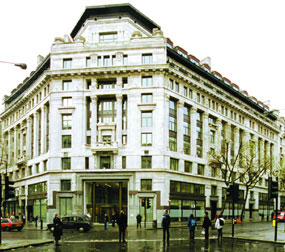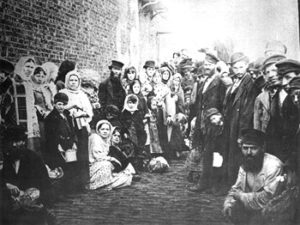The Growth of Genealogy
 I started my interest in family history when I was in my 20s. This was in the 1980s, when the hobby of genealogy was generally reserved for the middle-aged, and those who could afford to travel to local archives, including St. Catherine’s House (now Television House) in London where the Civil Registration indexes were held. Luckily for me, I worked for a while at Drury Lane Theatre, just around the corner from St. Catherine’s House, where I used to spend my lunch hour trying to find my grandmother’s marriage and birth! I can’t remember ever wondering why I felt my family history was important, I just found the search fascinating.
I started my interest in family history when I was in my 20s. This was in the 1980s, when the hobby of genealogy was generally reserved for the middle-aged, and those who could afford to travel to local archives, including St. Catherine’s House (now Television House) in London where the Civil Registration indexes were held. Luckily for me, I worked for a while at Drury Lane Theatre, just around the corner from St. Catherine’s House, where I used to spend my lunch hour trying to find my grandmother’s marriage and birth! I can’t remember ever wondering why I felt my family history was important, I just found the search fascinating.
The interest in genealogy has exploded over the last few decades, and that is partly because the internet has made it much easier to research many of our ancestors from the comfort of our homes. Motivation to start the search has also come from programmes such as Who Do You Think You Are, which has proved popular on both sides of the Atlantic.
Buy why are we so fascinated by our ancestors? Why is genealogy important in our lives?
If you’ve ever been pinned in a corner at a party by someone telling you all about their great-aunt Cynthia’s adventures as a suffragette, or boasting that their family line can be traced back to the Conqueror, then you may not feel that other people’s family history is as important to you as it is to them! But our own family history can be a source of great satisfaction and fascination.
I have my own theories on why genealogy is important – both to us in a personal way, but also in a wider context.
The Personal Context
Firstly, on a personal level, we as human beings are fascinated by our own selves. Psychology and personal development are big business, and on a lighter level, don’t we just love those silly quizzes in magazines or on Facebook that tell which Game of Thrones character we should be?
In some ways, I believe that genealogy is another form of self-analysis. Our ancestors formed who we are. We want to be able to see ourselves in our ancestors to make some sense of our own identities. We love to see our own physical features in the old photographs of our ancestors, but we also love to find out whether they were like us. I would love to know if any of my ancestors wrote stories, or enjoyed some of my other interests, such as history and the countryside.
We are the product of an enormous, ongoing genetic melting pot, and perhaps to some degree we have inherited much of ourselves through our genes. However, there is another way in which our characters and behaviours have been inherited. To a large degree, we are influenced by our upbringing. For most people that will be their natural birth parents. In turn, they were influenced by their parents, and so on. So, our ancestors help to form us through our genes, and through our upbringing.
For the large part, this explains our interest in family history. We are fascinated by our ancestors because we are fascinated with ourselves, and knowing who our ancestors are gives us a sense of identity and continuity.
The practice of researching ancestry has shown an increase in intelligence and confidence.
Interestingly, research has shown that a knowledge of our ancestry is good for our health. The practice of researching ancestry has shown an increase in intelligence and confidence. Thinking about how our ancestors survived difficulties far worse than our own can bring feelings of optimism about our own lives.
The Wider Context
It is my belief that studying our ancestry can also be of benefit to humanity as a whole. Studying our ancestors can bring us into touch in a very personal way with the kind of lives that we may not have experienced in our own lifetime. For example, some of my own ancestors lived in poverty in one of the worst polluted cities in the world in 19th and early 20th century Manchester. Some of them did not survive to middle age. By seeing this kind of suffering in our own family, surely, we become more empathic to the suffering of others in our own time.
 And, let us take the tricky subject of immigration. It seems these days that many people find it easy to be Nationalistic, to close borders, viewing immigrants as outsiders who should have no business with us.
And, let us take the tricky subject of immigration. It seems these days that many people find it easy to be Nationalistic, to close borders, viewing immigrants as outsiders who should have no business with us.
If we can go back far enough, we are all the descendants of immigrants.
But the study of genealogy will reveal that most people will have immigrants in their ancestry. An article in 2008 put the number for Brits as just over half. But of course, it depends on how far you trace your ancestry. If we can go back far enough, we are all the descendants of immigrants.
Many of those immigrants, whether it’s the Irish escaping the Irish Famine in the 1840s, or Jewish immigrants fleeing the pogroms of the late 19th and early 20th centuries, have come to this country seeking refuge in fear for their lives. Often, they have been met with suspicion and prejudice. People today, who view war refugees in the same way, should stop to think that their own ancestors were once in the same boat, so to speak.
So, yes, genealogy is important, for ourselves and for our humanity.

